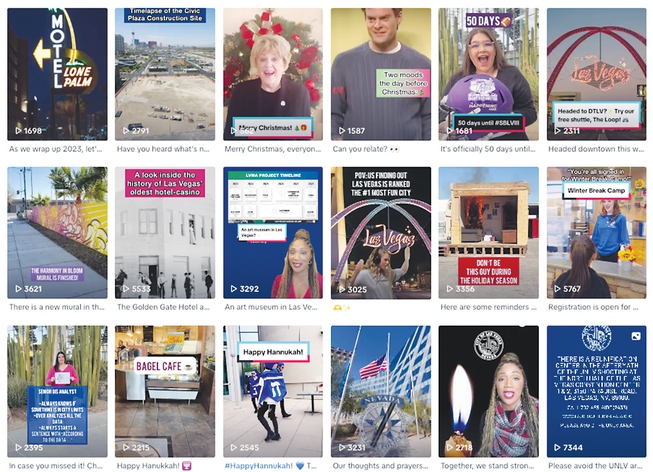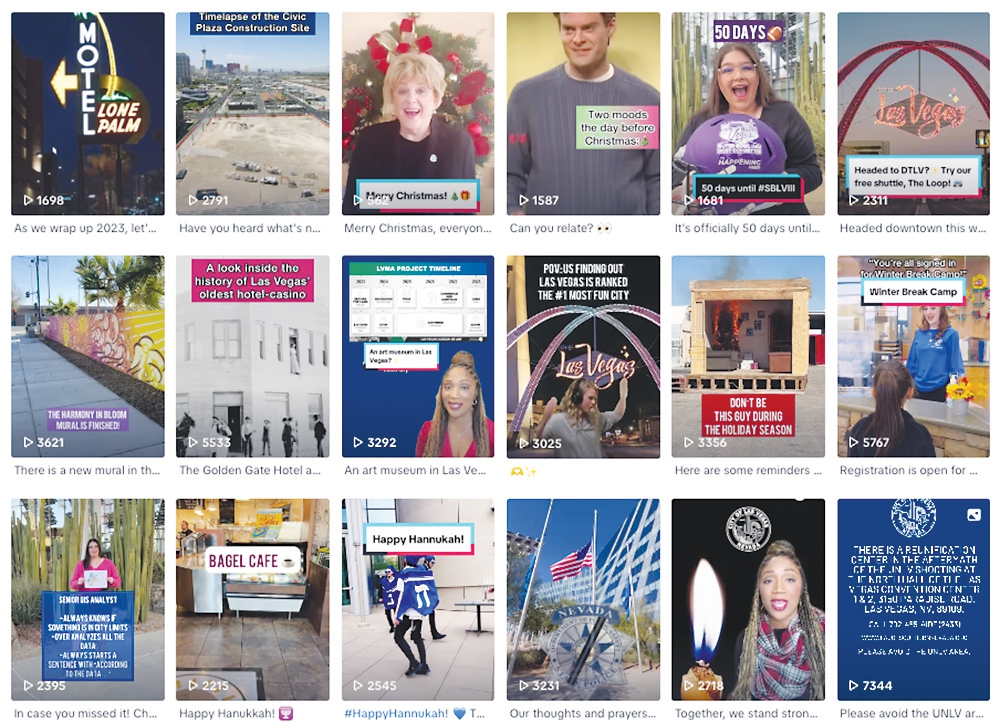
Tiktok screenshot
This screenshot from the city of Las Vegas’ TikTok account shows a sampling of some of the many TikTok videos the city has posted on its account. With TikTok’s future in the United States now in jeopardy, city officials say they’re taking a wait-and-see approach to using the social media site.
Thursday, April 25, 2024 | 2 a.m.
When you open the social media application TikTok and type in “Las Vegas,” you’ll get several videos — the brightly lit Sphere, local businesswoman Alexandra Lourdes decorating some of the pastries that Saint Honoré Doughnuts and Beignets is known for, or a review of the newest Vegas attraction by one of many travel influencers.
The app has more than clips of the city’s glitz and glam. Local governments utilize TikTok to connect with citizens or answer questions from tourists.
The city of Las Vegas established its TikTok account in early 2022 as another way to deliver information to residents, and the account has amassed over a million total views since then — the most popular being a video, with more than 1.1 million views to date, of Mayor Carolyn Goodman in a tongue-in-cheek presentation about what her job leading the city entails (“I’m the mayor of Las Vegas, but I still make dinner every night for the former mayor, my husband.”).
Officials say that residents “rely on the city to help address problems,” and will directly message them through social media platforms. From a holistic nutritional counselor looking to get involved with the city’s sustainable farming programs to tourists professing their love for Las Vegas, the team overseeing the city’s accounts has seen it all.
The city’s accounts received “more than 100,000 messages” in 2022, according to the city.
But TikTok’s future in Las Vegas, and across the country, could be in jeopardy.
President Joe Biden on Wednesday signed into law a $95 billion measure that includes assistance for Ukraine, Israel and Taiwan, and also has a provision that would force the social media app to be sold or be banned in the U.S.
Tucked into the measure is a provision that gives TikTok’s Beijing-based parent company, ByteDance, nine months to sell the application or face a nationwide prohibition in the United States. The president can grant a one-time extension of 90 days, bringing the timeline to sell to one year if he certifies that there’s a path to divestiture and “significant progress” toward executing it.
The administration and a bipartisan group of lawmakers have called the social media app a growing national security concern. The FBI, in late 2022, warned Congress of the dangers TikTok presented, including the possibility of data collection and that it controls algorithms that determine what millions of users see.
Lawmakers and administration officials since then have voiced similar concerns regarding Chinese authorities possibly forcing the company to share the data of its roughly 170 million American users or influence algorithms.
“Congress is not acting to punish ByteDance, TikTok or any other individual company,” Senate Commerce Committee Chairwoman Maria Cantwell told The Associated Press. “Congress is acting to prevent foreign adversaries from conducting espionage, surveillance, malign operations, harming vulnerable Americans, our servicemen and women, and our U.S. government personnel.”
TikTok said it would wage a legal challenge against what it called the “unconstitutional” U.S. demand.
“We believe the facts and the law are clearly on our side, and we will ultimately prevail,” the company said in a statement. “The fact is, we have invested billions of dollars to keep U.S. data safe and our platform free from outside influence and manipulation. This ban would devastate 7 million businesses and silence 170 million Americans.”
In a statement to the Sun, the city said it was monitoring the legislation but “in the meantime, … will continue to use the platform as a means of providing information to local residents and visitors.”
“TikTok has proven to be an effective means of communicating city services, activities and programs to a wide audience, but should it be eliminated, the city also has other strong social media platforms it will continue to use,”the statement read.
About 35,000 people follow the city’s official TikTok account. In comparison, its Instagram has around 168,000, but has been around since August 2013.
A city representative said last year that Las Vegas had no plans of slowing down the TikTok content amid concerns from the FBI and a growing number of states banning the application on federally issued social media devices. They explained that the city “has been a leader in government social media use as a way to get feedback from and provide information to residents and visitors,” but also have other social media accounts they can use.
But it has also become an important marketing tool for local influencers, business owners and even Southern Nevada itself. Nevada has no official TikTok account, but sectors like the state’s Department of Transportation and Division of Tourism do.
The Las Vegas Convention and Visitors Authority account — @vegas — has over 2 million followers, 12 million likes and almost 12,000 likes on its most popular video of the Sphere. Its content ranges from videos of new food to try in the valley to behind-the-scenes looks at popular shows such as Cirque du Soleil’s “O.”
Many of the videos attract comments from excited visitors ready to add a spot or activity to their vacation to-do list, while others draw questions. Answering them is as easy as a few clicks.
Elizabeth and Alexander Adeoye have promoted their shapewear brand SooSlick on the TikTok Shop since last March. The Las Vegas business had advertised on other social media platforms like Instagram but didn’t receive the same results as TikTok.
Their brand has grown by over 600% since SooSlick began selling on TikTok, Elizabeth Adeoye.
“The journey has been so good for our business,” she said. “As a small, Black-owned business, it’s really tough to get platforms that care about your business and growing your brand.”
Alexander Adeoye said they plan to sign petitions urging lawmakers to allow the app to continue operating.
“We came into this so excited and now … that’s why we’re so devastated,” Elizabeth Adeoye said. “Now, I’m thinking how we are going to sort it out. Hopefully this is not the end for us.”
Although other sites have followed its lead, TikTok was the first social media site to focus on distributing extremely short videos to users and then distributing them to other users via various algorithms, said Jackson Gilmore, founder and CEO of Los Angeles-based Oplae, which helps content creators preserve audience connections across social media applications.
“It’s really unfortunate, because (TikTok) has become such a community center, which is going back to the algorithm; that’s why it works so well, it really focuses on connecting people organically and we’re just not going to see that replicated, really anywhere, because it’s not in most of these platforms’ best interest,” Gilmore said.
It’s a formula that the application has banked on since its creation, and with the later advent of TikTok Shop, which allows users to see and purchase items through the application, many businesses have seen increased ease in getting customers, Gilmore explained.
The application also can serve as a tool for reaching audiences that were previously difficult to engage with due to its popularity with younger generations.
But an imminent ban on TikTok could bring many companies, organizations and governments that use the application back to square one. Gilmore said it would be especially difficult for the businesses that cultivated mass platforms on TikTok as opposed to Instagram or X, formerly known as Twitter.
Many content creators are already preparing to abandon the application in response to the recent bill passage, and Gilmore said he’s been working with them to develop a product called Backup that would help people maintain connections with the users who follow them. A few users in Las Vegas have already joined Gilmore, but he couldn’t release names due to privacy reasons.
While the city said it had other plans in place, Gilmore still believes banning TikTok “would certainly have an impact” and a “massive fall-off” of engagement for Las Vegas-related sites.
“I think when it comes to TikTok, it’s a powerful platform because it is so organic,” Gilmore said. “Unless there’s a way to back up these relationships, the large majority is going to be lost.”
The Associated Press contributed to this story.
[email protected] / 702-948-7854 / @gracedarocha

